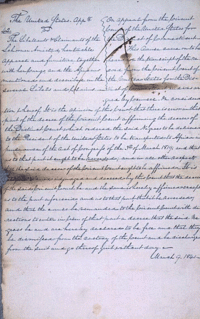The Amistad, also known as United States v. Libellants and Claimants of the Schooner Amistad, 40 U.S. (15 Pet.) 518 (1841), was a United States Supreme Court case resulting from the rebellion of slaves on board the Spanish schooner Amistad in 1839. It was an unusual “freedom suit“, as it involved international issues and parties, as well as United States law.
The rebellion broke out when the schooner, traveling along the coast of Cuba, was taken over by a group of captives who had earlier been kidnapped in Africa and sold into slavery. The Africans were later apprehended on the vessel near Long Island, New York, by the United States Revenue Cutter Service and taken into custody. The ensuing, widely publicized court cases in the United States helped the abolitionist movement.
In 1840, a federal trial court found that the initial transport of the Africans across the Atlantic (which did not involve the Amistad) had been illegal, because the international slave trade had been abolished, and the captives were thus not legally slaves but free. Given that they were illegally confined, the Africans were entitled to take whatever legal measures necessary to secure their freedom, including the use of force. After the US Supreme Court affirmed this finding on March 9, 1841, supporters arranged transportation for the Africans back to Africa in 1842. The case influenced numerous succeeding laws in the United States.
 Arguments before the Supreme Court
Arguments before the Supreme Court
On February 23, 1841, Attorney General Henry D. Gilpin began the oral argument phase before the Supreme Court. Gilpin first entered into evidence the papers of La Amistad which stated that the Africans were Spanish property. The documents being in order, Gilpin argued that the Court had no authority to rule against their validity. Gilpin contended that if the Africans were slaves (as evidenced by the documents), then they must be returned to their rightful owner, in this case, the Spanish government. Gilpin’s argument lasted two hours.
John Quincy Adams, former President of the United States and at that time a U.S. Representative from Massachusetts, had agreed to argue for the Africans, but when it was time for him to argue, felt ill-prepared. Roger Sherman Baldwin, who had already represented the captives in the lower cases, opened in his place.
Baldwin, a prominent attorney (who was no relation to Justice Baldwin, the lone dissenter on the Court) contended that the Spanish government was attempting to manipulate the Court to return “fugitives”. In actuality, Baldwin argued, the Spanish government sought the return of slaves, who had been freed by the District Court, a fact that the Spanish government was not appealing. Covering all the facts of the case, Baldwin spoke for four hours over the course of the 22nd and the 23rd.
John Quincy Adams rose to speak on February 24. First, he reminded the court that it was a part of the judicial branch, and not part of the executive. Adams introduced correspondence between the Spanish government and the Secretary of State, criticizing President Martin van Buren for his assumption of unconstitutional powers in the case.
This review of all the proceedings of the Executive I have made with utmost pain, because it was necessary to bring it fully before your Honors, to show that the course of that department had been dictated, throughout, not by justice but by sympathy – and a sympathy the most partial and injust. And this sympathy prevailed to such a degree, among all the persons concerned in this business, as to have perverted their minds with regard to all the most sacred principles of law and right, on which the liberties of the United States are founded; and a course was pursued, from the beginning to the end, which was not only an outrage upon the persons whose lives and liberties were at stake, but hostile to the power and independence of the judiciary itself.
Adams argued that neither Pinckney’s Treaty nor the Adams-Onis Treaty were applicable to the case. Article IX of Pinckney’s Treaty referred only to property, and did not apply to people. As to The Antelope decision (10 Wheat. 124), which recognized “that possession on board of a vessel was evidence of property”, Adams said that did not apply either, since the precedent there was established prior to the prohibition of the foreign slave trade in the United States. Adams concluded after eight and one-half hours of speaking on March 1 (the Court had taken a recess following the death of Associate Justice Barbour).
Attorney General Gilpin concluded oral argument with a three-hour rebuttal on March 2. The Court retired to consider the case.
Decision of the Supreme Court
On March 9, Associate Justice Joseph Story delivered the Court’s decision. Article IX of Pinckney’s Treaty was ruled off topic since the Africans in question were never legal property. They were not criminals, as the U.S. Attorney’s Office argued, but rather “unlawfully kidnapped, and forcibly and wrongfully carried on board a certain vessel”. The documents submitted by Attorney General Gilpin were not evidence of property, but rather of fraud on the part of the Spanish government. Lt. Gedney and the USS Washington were to be awarded salvage from the vessel for having performed “a highly meritorious and useful service to the proprietors of the ship and cargo”.
When La Amistad came into Long Island, however, the Court believed it to be in the possession of the Africans on board, who had no intent to become slaves. Therefore, the Adams-Onis Treaty did not apply, and the President was not required to return the slaves to Africa.
Upon the whole, our opinion is, that the decree of the circuit court, affirming that of the district court, ought to be affirmed, except so far as it directs the negroes to be delivered to the president, to be transported to Africa, in pursuance of the act of the 3rd of March 1819; and as to this, it ought to be reversed: and that the said negroes be declared to be free, and be dismissed from the custody of the court, and go without delay.


 On this day in 1959,
On this day in 1959,  On 1 March 1959, an unusual invitation to attend a theatrical performance at the Chinese military headquarters outside Lhasa was extended to the Dalai Lama. The Dalai Lama, at the time studying for his
On 1 March 1959, an unusual invitation to attend a theatrical performance at the Chinese military headquarters outside Lhasa was extended to the Dalai Lama. The Dalai Lama, at the time studying for his  On 12 March, protesters appeared in the streets of Lhasa declaring Tibet’s independence. Barricades went up on the streets of Lhasa, and Chinese and Tibetan rebel forces began to fortify positions within and around Lhasa in preparation for conflict. A petition of support for the armed rebels outside the city was taken up, and an appeal for assistance was made to the Indian consul. Chinese and Tibetan troops continued moving into position over the next several days, with Chinese artillery pieces being deployed within range of the Dalai Lama’s summer palace, the Norbulingka. On 15 March, preparations for the Dalai Lama’s evacuation from the city were set in motion, with Tibetan troops being employed to secure an escape route from Lhasa. On 17 March, two artillery shells landed near the Dalai Lama’s palace, triggering his flight into exile. On 19 March the Chinese started to shell the Norbulingka, prompting the full force of the Uprising. According to the freetibet website, on 21 March 800 shells rained down on the palace, including the shelling of the Norbulingka and Lhasa’s major monasteries, slaughtering thousands of Tibetan men, women and children. Combat lasted only about two days, with Tibetan rebel forces being badly outnumbered and poorly armed.
On 12 March, protesters appeared in the streets of Lhasa declaring Tibet’s independence. Barricades went up on the streets of Lhasa, and Chinese and Tibetan rebel forces began to fortify positions within and around Lhasa in preparation for conflict. A petition of support for the armed rebels outside the city was taken up, and an appeal for assistance was made to the Indian consul. Chinese and Tibetan troops continued moving into position over the next several days, with Chinese artillery pieces being deployed within range of the Dalai Lama’s summer palace, the Norbulingka. On 15 March, preparations for the Dalai Lama’s evacuation from the city were set in motion, with Tibetan troops being employed to secure an escape route from Lhasa. On 17 March, two artillery shells landed near the Dalai Lama’s palace, triggering his flight into exile. On 19 March the Chinese started to shell the Norbulingka, prompting the full force of the Uprising. According to the freetibet website, on 21 March 800 shells rained down on the palace, including the shelling of the Norbulingka and Lhasa’s major monasteries, slaughtering thousands of Tibetan men, women and children. Combat lasted only about two days, with Tibetan rebel forces being badly outnumbered and poorly armed.

 On this day in 1841,
On this day in 1841, 

 On this day in 1911,
On this day in 1911,  Following the
Following the 
Recent Comments